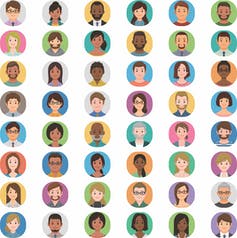Marginalized people often suffer the most harm from unintended consequences of new technologies. For example, the algorithms that automatically make decisions about who gets to see what content or how images are interpreted suffer from racial and gender biases. People who have multiple marginalized identities, such as being Black and disabled, are even more at risk than those with a single marginalized identity.
This is why when Mark Zuckerberg laid out his vision for the metaverse – a network of virtual environments in which many people can interact with one another and digital objects – and said that it will touch every product the company builds, I was scared. As a researcher who studies the intersections of race, technology and democracy – and as a Black woman – I believe it is important to carefully consider the values that are being encoded into this next-generation internet.

A racial divide is already emerging in the value of avatars that represent users in virtual environments.
yuoak/DigitalVision Vectors via Getty Images
Problems are already surfacing. Avatars, the graphical personas people can create or buy to represent themselves in virtual environments, are being priced differently based on the perceived race of the avatar, and racist and sexist harassment is cropping up in today’s pre-metaverse immersive environments.
Ensuring that this next iteration of the internet is inclusive and works for everyone will require that people from marginalized communities take the lead in shaping it. It will also require regulation with teeth to keep Big Tech accountable to the public interest. Without these, the metaverse risks inheriting the problems of today’s social media, if not becoming something worse.
Utopian visions versus hard realities
Utopian visions in the early days of the internet typically held that life online would be radically different from life in the physical world. For example, people envisioned the internet as a way to escape parts of their identity, such as race, gender and class distinctions. In reality, the internet is far from raceless.
While techno-utopias communicate desired visions of the future, the reality of new technologies often doesn’t live up to these visions. In fact, the internet has brought novel forms of harm to society, such as the automated dissemination of propaganda on social media and bias in the algorithms that shape your online experience.
Zuckerberg described the metaverse as a more immersive, embodied internet that will “unlock a lot of amazing new experiences.” This is a vision not just of a future internet, but of a future way of life. However off target this vision might be, the metaverse is likely – like earlier versions of the internet and social media – to have widespread consequences that will transform how people socialize, travel, learn, work and play.
The question is, will those consequences be the same for…